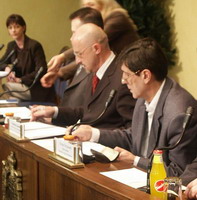- Serbia
Get to know Serbia
- Citizens
Culture and science
Health services
Pension and disability insurance
- Business
Employment
Economy
- Media
- Government
- Contact
Keep in touch
Contact form
Back
Keepin touch
Whether you have a question, comment, suggestion or any problem in the purview of the government, send us your message and we will try to respond as soon as possible. If your problem is not in our purview, we will forward your message to the relevant institution.
Q:
A:
Productivity increase crucial for Serbian economy
Belgrade,
28 December 2004
The main issue of boosting productivity is crucial for survival of the Serbian economy, Serbian Minister of Labour, Employment and Social Policy Slobodan Lalovic said today at the signing of a work productivity programme.
The agreement was signed by Minister of Economy Predrag Bubalo, President of the Work Productivity Centre Petar Petrovic and Zoran Branovacki of the Serbian Chamber of Commerce.
Lalovic said that when it comes to productivity, Serbia is at the bottom in Europe, noting that only after there are productivity increases in the economy can we expect to be competitive.
Serbia will have to open up its borders in the years to come and Serbian companies will have to compete on the market, but they will have no chance if they do not raise their productivity, Lalovic said.
The Minister said that an increase in productivity is a good foundation for upgrading salaries in the long run.
According to him, the Ministry of Labour, Employment and Social Policy expects that within six months there will be productivity increases in the companies involved in the Ministry’s pilot programme. He said that if this programme proves to be successful in the ten trial companies, it will apply to the whole Serbian economy.
Serbian Minister of Economy Predrag Bubalo said that raising productivity is essential for Serbia’s economy, adding that there are two ways to boost productivity.
One of them is the “mechanical” raising of productivity, through social programmes and by resolving the problems of surplus labour in companies.
The other way to raise productivity, according to Bubalo, is re-organisation of production and modernisation of Serbia’s obsolete equipment. This will bring us closer to the European Union and improve the quality of our industry, said Bubalo.
Chairman of the Centre for Productivity Petar Petrovic said the project to raise productivity was presented to the Ministry of Labour immediately after it was promoted in Turin, Italy, in March this year.
This model was tested on 25,000 companies in Sweden and it gave great results, according to Petrovic. He said that this model is being applied in Great Britain, Italy, Sweden, and Portugal.
Lalovic said that when it comes to productivity, Serbia is at the bottom in Europe, noting that only after there are productivity increases in the economy can we expect to be competitive.
Serbia will have to open up its borders in the years to come and Serbian companies will have to compete on the market, but they will have no chance if they do not raise their productivity, Lalovic said.
The Minister said that an increase in productivity is a good foundation for upgrading salaries in the long run.
According to him, the Ministry of Labour, Employment and Social Policy expects that within six months there will be productivity increases in the companies involved in the Ministry’s pilot programme. He said that if this programme proves to be successful in the ten trial companies, it will apply to the whole Serbian economy.
Serbian Minister of Economy Predrag Bubalo said that raising productivity is essential for Serbia’s economy, adding that there are two ways to boost productivity.
One of them is the “mechanical” raising of productivity, through social programmes and by resolving the problems of surplus labour in companies.
The other way to raise productivity, according to Bubalo, is re-organisation of production and modernisation of Serbia’s obsolete equipment. This will bring us closer to the European Union and improve the quality of our industry, said Bubalo.
Chairman of the Centre for Productivity Petar Petrovic said the project to raise productivity was presented to the Ministry of Labour immediately after it was promoted in Turin, Italy, in March this year.
This model was tested on 25,000 companies in Sweden and it gave great results, according to Petrovic. He said that this model is being applied in Great Britain, Italy, Sweden, and Portugal.
-
 Belgrade, 26 November 2025
Belgrade, 26 November 2025Serbia-Hungary partnership best example of European cooperation
-
 Belgrade, 22 January 2025
Belgrade, 22 January 2025Egypt one of Serbia’s closest partners on international stage
-
 Belgrade, 9 July 2024
Belgrade, 9 July 2024Support for 104 associations in diaspora that preserve Serbian language, culture
-
 Belgrade, 15 April 2024
Belgrade, 15 April 2024Competition for StarTech grants open until 31 May
-
 Belgrade, 2 October 2023
Belgrade, 2 October 2023Serbia respects Resolution 1244 and will do everything to preserve peace
-
 Belgrade, 13 September 2023
Belgrade, 13 September 2023Day of Serbian Unity to be celebrated outside borders of Serbia, Republika Srpska for the first time
-
 Belgrade, 8 August 2023
Belgrade, 8 August 2023RSD 24.2m in state aid paid out to citizens affected by storm
-
 Belgrade, 17 June 2023
Belgrade, 17 June 2023Belgrade is doing everything to preserve peace in Kosovo and Metohija
-
 Belgrade, 15 June 2023
Belgrade, 15 June 2023Slovenia will continue to support Serbia on its way to EU
-
 Belgrade, 5 May 2023
Belgrade, 5 May 2023Emergency measures, tightening of conditions for possessing weapons


